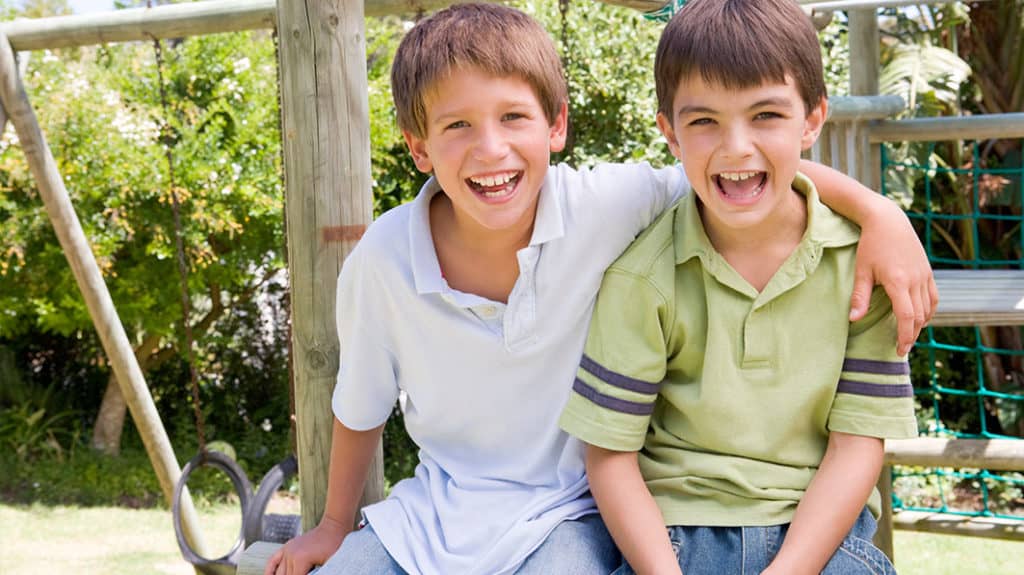
Navigate Family Differences With This Personality Quiz
Relating to different personalities is not always easy. Take the quiz to find out and understand the unique strengths within your family and how to better relate to one another.
August 31, 2015

Help your child learn the necessary traits for developing friendships.
What can parents do when their child wants to make friends?
My heart broke as I listened to the sounds of my 9-year-old son’s sobs coming from behind his bedroom door. Our family’s recent move meant leaving behind friends he’d had for years. Now in a new school, he found himself trying desperately to find a niche for himself. I wanted to take him back to the safety and security of people we knew and loved. I wanted to scream, “Don’t you see what a great kid he is?” to the classroom of kids currently ignoring him.
Childhood friendships come and go, and our kids must learn the delicate balance of relationships by navigating the sometimes-rough waters of friendship. As parents, we can’t make our children’s friends for them, but we can provide a positive context in which friendship can develop. We can’t direct the wind, but we can adjust the sails. We can teach our children the wise skills and manners needed for being a good friend.
I tell parents a simple acronym, ALERT, to help them remember the qualities necessary for making and keeping friends. As you help your children relate to others, keep these traits in mind:
A — Amiable
Generally speaking, nice kids have friends. If a child relates with ease and gets along with others, he’ll be able to develop friendships. At a minimum, amiable kids speak to others when spoken to. But more frequently, amiable kids initiate relationships. They say hi to other kids at the park, at school or on the field. They smile. They play fairly. They listen and laugh, and they’re pleasant to be around.
L — Loyal
When asked to name important qualities of good friends, a group of my daughter’s 12-year-old buddies piped up with, “You can count on them” and “They don’t talk behind your back.” These girls were describing loyalty.
Kids who make and keep friends do so because they are not fickle — friendly one day and aloof the next. They do not talk badly about friends. They don’t embarrass others by teasing or sharing private information. Amiable kids make friends. Loyal kids keep friends.
E — Encouraging
Several years ago we lived next door to the most encouraging kid I have ever known. He routinely cheered other kids on with comments like “Good job,” “Way to go,” and “Great shot” as the neighborhood kids played. He wasn’t silly, insincere or gushy. He was simply an encouraging kid. Not surprisingly, he was also a kid with a lot of friends.
Encouraging people have friends because encouraging people live others-centered rather than self-centered lives. It’s hard to dislike an encouraging person.
R — Respectful
It has been said that true friendship starts the moment one person says to another, “You too? I thought I was the only one!” But an often overlooked benefit of friendship is the connection with people who are different from ourselves.
Kids who treat other people — however similar or different — with value and worth behave with respect. Listening when someone speaks, appreciating different ways of doing things, following through with commitments made, these actions communicate respect. And a child who respects others attracts friends.
In addition, people — kids included — are drawn to others who feel comfortable with themselves. When children respect themselves, they are able to set healthy relationship boundaries, negotiate conflict and feel the freedom to explore new relationships.
T — Thoughtful
Dale Carnegie once said, “You can make more friends in two months by becoming really interested in other people than you can in two years by trying to get other people interested in you.” If a child can grasp this concept, a child can make friends.
Encourage your kids to ask others questions about themselves. “Do you have any pets?” “What’s your favorite sport?” “Where do you go to school?” Questions like these can be good conversation starters with which kids can find common areas of interest.
Remembering a birthday or asking about a friend’s important gymnastics meet, football game or musical concert also shows thoughtfulness. A simple “How did your game go?” or “Did you have fun at your concert last night?” communicates interest in the events of a friend’s life.
Finally, treating a friend with good manners shows thoughtfulness. When a child remembers to offer his friend food or a drink, lets a guest go first or choose what game to play, he demonstrates thoughtfulness. Thoughtfulness cultivates the groundwork for friendship to thrive.
These five qualities are essential to develop and maintain healthy friendships. If your child is inadequate in one or more of these areas, you need to be honest with your child and let him know that every behavior bears a consequence. Some behaviors, like the ones mentioned in the ALERT acronym above, attract others and help a child build real friendships.